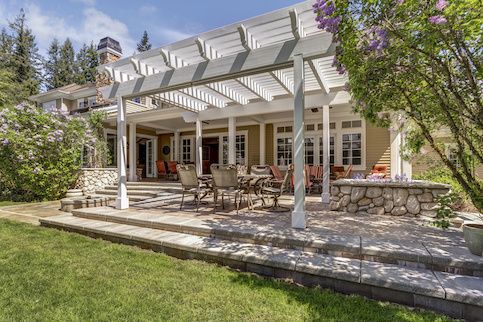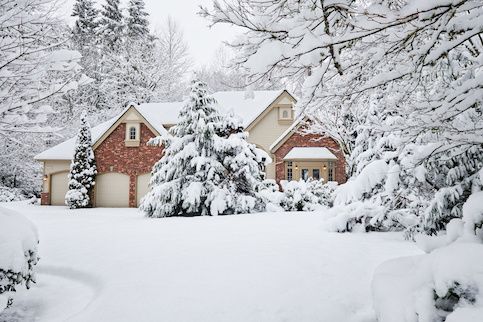When times are tough, you may struggle to keep up with all your bills. Of course, you don’t want to fall behind on any monthly expenses, but if you can’t keep up with your monthly mortgage payments, you risk a mortgage default and potentially losing your house.
Fortunately, knowing what proactive steps to take can significantly reduce the risk of losing your home due to mortgage default.
What Does It Mean To Default On A Mortgage Loan?
When a borrower defaults on a loan, it means they’ve failed to make monthly payments for a sustained period.
While defaulting on any loan should be avoided, a mortgage default may lead to foreclosure and losing your home. Even if you can resolve the mortgage default, it will still damage your credit score and make it challenging to qualify for future loans.
What’s Your Goal?
Buy A Home
Discover mortgage options that fit your unique financial needs.

Refinance
Refinance your mortgage to have more money for what matters.
Tap Into Equity
Use your home’s equity and unlock cash to achieve your goals.
How Does A Home Loan Default Happen?
While missing monthly payments is the most common way to default on a home loan, it’s not the only way. Homeowners can also go into default if they:
- Fail to pay their property taxes
- Fail to pay their homeowners insurance
- Transfer their home’s title to a new owner without their lender’s permission
- Purchase a property illegally or currently use it for illegal activities, like drug trafficking or money laundering
Ready To Refinance?
Get matched with a lender that can help you reach your financial goals.
What Happens When You Default On A Mortgage?
If you go into mortgage default, most lenders will present the opportunity to apply for repayment options before they resort to repossessing your property.
If you don’t promptly communicate with your lender to discuss your financial difficulties and explore potential solutions, you can expect to experience these next steps.
Your Lender Accelerates Your Debt
Your lender may enforce the acceleration clause in your mortgage agreement if you’re more than 30 days late on the mortgage. The clause allows them to accelerate the debt and demand immediate repayment of your remaining loan balance. Triggering the acceleration clause increases the risk of foreclosure significantly.
However, it’s unlikely that your lender will accelerate your debt immediately after you fall behind on your loan payment. Your lender will likely help you find an appropriate repayment solution before applying the acceleration clause.
Your Home May Go Into Foreclosure
If you can’t pay the outstanding balance on your mortgage and you’ve exhausted all other options, your lender can move to foreclose on your house. Though it depends on state laws, foreclosure proceedings usually begin at least 120 days after loan delinquency.
You May Lose Your Home
You’ll have to move out of the home if you can’t resolve the default before the foreclosure process is finalized. Once control over the property transfers to your lender, they’ll auction it off to a new owner to recover as much of the outstanding mortgage balance as they can.
View Your Refinancing Options
Find a refinance lender that will work with your unique financial situation.
How To Avoid A Mortgage Default
Defaulting on your loan and losing your home can be an overwhelming and stressful experience. Fortunately, in most cases, lenders prefer to work with borrowers and explore options to help them catch up on their mortgage payments and stay in their homes. Also, the foreclosure process won’t happen overnight. Even while facing financial hardship, you have several options to explore to avoid defaulting on your mortgage.
1. Find Out If You Can Refinance
If you’re struggling to keep up with your monthly payment but haven’t defaulted, see if you qualify to refinance. When you refinance, your existing mortgage gets paid off and replaced with a new loan with new terms.
The new loan may feature a lower interest rate or extend your loan term. Refinancing can potentially lower your monthly payments, making them more affordable and manageable.
2. Speak With Your Servicer
Talk to your loan servicer the moment you suspect you won’t be able to make an on-time monthly mortgage payment. The sooner you reach out, the better your chances of avoiding mortgage default.
Explain why you can’t afford the payment now, when you think you can make the payment and how much you can pay in the meantime. By reaching out in advance, lenders and borrowers can work together to find an appropriate solution for overdue payments and potentially avoid mortgage default.
3. Ask About Mortgage Forbearance
Depending on the financial hardship, you may qualify for mortgage forbearance, a program offered by lenders that temporarily reduces or pauses monthly payments as you work with them on a repayment plan.
4. Consider A Mortgage Loan Modification
A loan modification allows you to keep your current home loan but temporarily or permanently change its terms. The loan modification can reduce your monthly payments while folding your past-due payments back into the mortgage.
Compared to refinancing, loan modifications tend to have a more significant negative impact on your credit score. Folding your past-due payments into the loan may cause you to pay even more for your home due to the additional interest you’ll pay after the rate and term changes.
5. Sell Your Home Before You Default
While it may be difficult to consider, your best option may be to sell your home when you can no longer afford the payments. When you sell, you may get back any home equity you’ve built before it’s lost to foreclosure. Keep the time it takes to sell a home in mind and find out if you need your lender’s permission to put your home on the market.
You should also consider home selling costs, such as real estate agent commissions. If the proceeds from the sale can’t cover these expenses, you may end up even deeper in debt.
6. Sell Your Home Using A Short Sale
Consider a short sale if you can’t sell your home in a traditional home sale. With a short sale, you and your lender agree to sell the home for less than the amount owed on the mortgage.
The home sale proceeds go toward your loan balance. Depending on the terms of your agreement, your lender will forgive any remaining balance or require payback for the outstanding loan amount.
A short sale is still a better option than foreclosure because it will do less damage to your credit score.
7. Offer Your Lender A Deed In Lieu Of Foreclosure
With a deed in lieu of foreclosure, you voluntarily transfer the deed of your home to your lender to avoid foreclosure. If you want to help accelerate your path to homeownership, a deed in lieu of foreclosure can allow you to apply for a new conventional loan in 4 years.
For government-backed loans, you can expect to wait 3 years to reapply for a U.S. Department of Agriculture (USDA) loan. The waiting period for a Federal Housing Administration (FHA) and Department of Veterans Affairs (VA) loan is 2 years.
Following a foreclosure, you’ll likely wait 7 years before you can apply for another mortgage since the foreclosure will stay on your credit report during those 7 years.
8. Ask About Homeowner Assistance Programs
The Department of Housing and Urban Development (HUD) has counselors who can help you evaluate your financial situation and find a solution to help prevent default.
Various state and federal programs assist borrowers in danger of defaulting. A HUD counselor can explain your options, help you select a program and speak to your lender on your behalf.
The Bottom Line
Whether your monthly mortgage payment is late or you’re facing financial difficulties that are preventing you from paying your mortgage, you can still take steps to avoid foreclosure. Contact your lender when you realize you may be in danger of missing a payment so they can help you find a solution before the potential risk of default.

Tai Le
Tai Le is a longtime member of the editorial team at Quicken Loans, focused on supporting home buyers and homeowners as they navigate the process of getting a mortgage and refinancing. He works closely with experts to create relevant content for people seeking reliable financial information. Originally from Long Beach, California, Tai lived in Miami for many years before purchasing a home with his wife in the Tampa Bay area of Florida, which gave him a firsthand understanding of the challenges and decisions involved in the home buying journey. With extensive experience in personal finance, insurance and travel, Tai has also helped build notable brands like Carnival Cruise Line and LowerMyBills.












